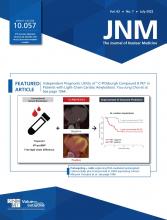Following in the footsteps of others (1), we have written about insurance denials. We argued about it in the context of 18F-FDG PET/CT imaging (2), 68Ga-DOTATATE imaging (3), 177Lu-DOTATATE therapy (Lutathera; Advanced Accelerator Applications) (4), and 18F-fluciclovine PET/CT imaging (2). Hicks has written about this in the context of Australian and worldwide insurance coverage discussions for 18F-FDG PET/CT (1).
Now, we must write again about major U.S. insurance companies, including Anthem Blue Cross, United Healthcare, Cigna, Blue Shield, and Aetna, and their repeated and inconsistent non-coverage decisions arbitrarily denying clinically indicated prostate-specific membrane antigen (PSMA) PET/CT imaging studies in around 10% to more than 60% of their patients (Table 1).
PSMA PET/CT Denials by Insurance from September 2021 to March 2022
Here is one example of the reasoning behind insurance denial in a patient with high-risk prostate cancer (Gleason score of 8, serum prostate-specific antigen level > 10 ng/mL) who needs to know whether pelvic (N1) lymph nodes are involved or distant disease is already present (M1a, M1b, M1c). PSMA PET/CT is the best imaging study to obtain this critically important information for determining the best therapeutic strategy. The insurance denial document states that “there are not enough medical studies showing that this test is better or safer than other tests that can be done for your problem. Other tests (which are typically considered standard of care) can be covered. These include chest CT and abdomen/pelvis CT.”
The U.S. Food and Drug Administration approved University of California San Francisco/UCLA’s 68Ga-PSMA-11 (December 1, 2020), Lantheus’ 18F-DCFPyL Pylarify (May 27, 2021), and Telix’ Illuccix cold kit for 68Ga-PSMA-11 (December 20, 2021) for 2 indications: PET of PSMA-positive lesions in men with prostate cancer or with suspected metastasis who are candidates for initial definitive therapy, and men with suspected recurrence based on elevated serum prostate-specific antigen levels. Recently the FDA also approved Novartis’ Locametz cold kit for 68Ga-PSMA-11 (March 23, 2022) for the same indications and also for selection of patients with metastatic prostate cancer for whom 177Lu-PSMA-directed therapy is indicated. The Centers for Medicare and Medicaid Services approved reimbursement for 68Ga-PSMA-11 on July 1, 2021, and Pylarify and Illuccix late in 2021.
The National Comprehensive Cancer Network (NCCN) has added 68Ga- and 18F-based PSMA PET imaging modalities to its clinical practice guidelines for prostate cancer (5). The NCCN panel has recognized the increased sensitivity and specificity of PSMA PET tracers, compared with conventional imaging (CT, MRI), for detecting micrometastatic disease at both initial staging and biochemical recurrence. The updated guidelines state that the NCCN panel does not feel that conventional imaging is a necessary prerequisite to PSMA PET and that PSMA PET/CT or PSMA PET/MRI (performed with either 68Ga-PSMA-11 or 18F-DCFPyL) can serve as equally effective, if not more effective, front-line imaging tools for these patients. The NCCN Panel states that either 68Ga-PSMA-11 or 18F-piflufolastat PSMA imaging can be used to determine eligibility for 177Lu-PSMA therapy. These approvals were based on large-scale clinical trials that unambiguously showed that PSMA-targeted imaging is the most accurate test to determine stage (6,7), site of biochemical recurrence (8), source of rising prostate-specific antigen level at any stage of the disease, and to determine target expression eligibility for PSMA-targeted therapy.
We have repeatedly asked our peers in the denial business to become informed, to read, and to stay up to date. We have asked them to take pride in competence and knowledge and have some compassion for patients who go through very difficult times emotionally and financially (as out-of-pocket costs can be as high as $6,000 for PET/CT scans).
Yet the denials keep coming, and we are still trapped inside paralyzing phone trees waiting for peer-to-peer discussions that are devoid of common sense and knowledge. Patients deserve better service from the insurance companies who they support with their premium payments.
DISCLOSURE
Johannes Czernin is a founder of Sofie Biosciences and holds equity in the company and in intellectual property invented by him, patented by the University of California, and licensed to Sofie Biosciences. He is also a founder and board member of Trethera Therapeutics and holds equity in the company and in intellectual property invented by him, patented by the University of California, and licensed to Triangle. He also serves on the medical advisory board of Actinium Pharmaceuticals and on the scientific advisory boards of POINT Biopharma, RayzeBio, and Jubilant Pharma and is a consultant for Amgen. No other potential conflict of interest relevant to this article was reported.
- © 2022 by the Society of Nuclear Medicine and Molecular Imaging.







